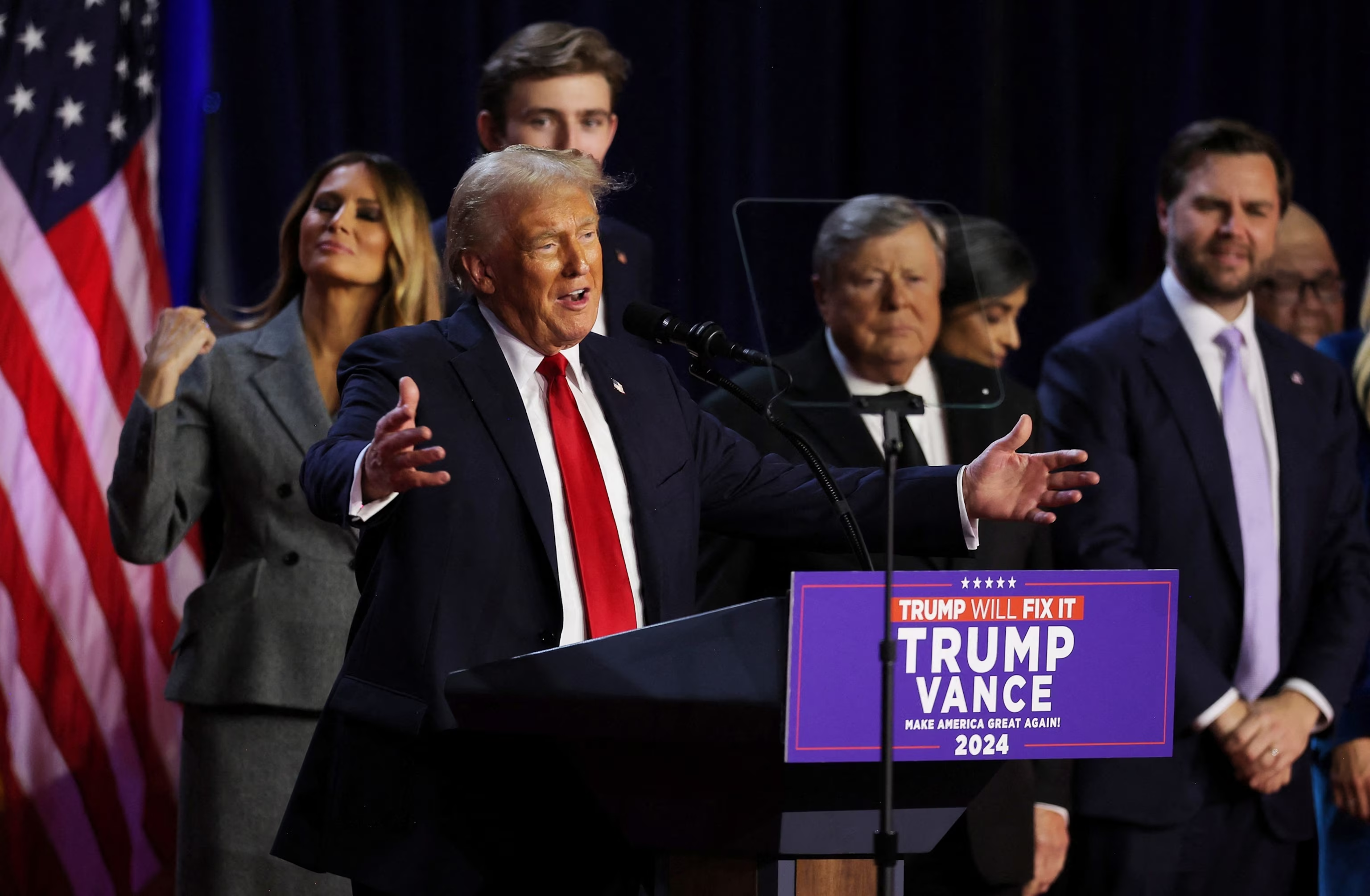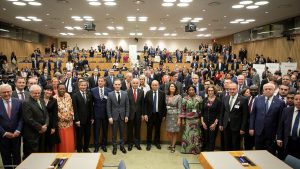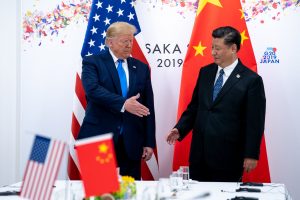 Now we are out a bit early. But that’s not surprising because of the US national elections on Tuesday night. So a few thoughts on that and then a redirection to the, “what do we do about the global order in the light of Trump’s return, including many of his former advisers, to the White House”
Now we are out a bit early. But that’s not surprising because of the US national elections on Tuesday night. So a few thoughts on that and then a redirection to the, “what do we do about the global order in the light of Trump’s return, including many of his former advisers, to the White House”
The electoral equation in the end proved to be rather simple if also somber. Harris lost too many non-college and latino men and she won women – but not by nearly enough. With the Latinos, Trump won 32 percent in 2020; in 2024 Trump won about 45 percent. Harris, on women, won 54 percent but Biden in 2020 won 57 percent. The Harris statistic on women is dismaying.
Now I am not one to focus and comment on US elections – other than as a ‘somewhat informed’ but non-expert – but it does seem to me that the Harris campaign did not strategically break through with a host of electoral groups with her message. And she needed to to secure the Presidency. As Michael Hirsh described in FP:
Despite overpowering Trump in their only debate on Sept. 10 and raising more than $1 billion in donations in just three months—a new record—Harris often floundered when challenged to deliver a convincing summary of her agenda on critical issues such as the economy and immigration. She also fumbled badly in explaining her flip-flops on issues such as fracking (which she once opposed and later supported, but without pointing out the simple fact that improved technology had made it environmentally safer). That led Wall Street Journal commentator Peggy Noonan to label Harris an “artless dodger.”
Worse, possibly, was the view expressed by Opinion Writer Peter Baker who suggests that Trump represents a significant current of American thinking. As he wrote in the NYT:
The assumption that Mr. Trump represented an anomaly who would at last be consigned to the ash heap of history was washed away on Tuesday night by a red current that swept through battleground states — and swept away the understanding of America long nurtured by its ruling elite of both parties. … With his comeback victory to reclaim the presidency, Mr. Trump has now established himself as a transformational force reshaping the United States in his own image.
No longer can the political establishment write off Mr. Trump as a temporary break from the long march of progress, a fluke who somehow sneaked into the White House in a quirky, one-off Electoral College win eight years ago. With his comeback victory to reclaim the presidency, Mr. Trump has now established himself as a transformational force reshaping the United States in his own image.
Populist disenchantment with the nation’s direction and resentment against elites proved to be deeper and more profound than many in both parties had recognized. Mr. Trump’s testosterone-driven campaign capitalized on resistance to electing the first woman president.
In fact, according to Baker, Trump was appreciated for all his effrontery and racism:
Rather than be turned off by Mr. Trump’s flagrant, anger-based appeals along lines of race, gender, religion, national origin and especially transgender identity, many Americans found them bracing. Rather than be offended by his brazen lies and wild conspiracy theories, many found him authentic.
So with Trump in the White House and his people in the Administration where do we go? On the immediate geopolitical front we are very likely to see rising tensions with China – though I believe there is a path to less tension. We are very likely to see pressure on Ukraine to halt the conflict with Putin even at the cost of transferring Ukrainian lands to Russia – a real cost and speaking of costs we are likely to see a blizzard of tariffs on Chinese goods and possibly beyond. But it is a bit early to fill in the contours of Trump 2.0 foreign policy.
But, instead, let me look at the outline of the direction we saw coming from Democrat and Democrat-leaning experts and operatives. In particular let me look briefly at the design described by Anne-Marie Slaughter in a recent Foreign Affairs piece titled: “How America Can Succeed in a Multialigned World: The Importance of Building Truly Global Partnerships”. Anne-Marie is currently CEO of the think tank New America. From 2002 to 2009, she was Bert G. Kerstetter ‘66 University Professor of Politics and International Affairs and Dean of the School of Public and International Affairs at Princeton University. In 2009 Secretary of State Hillary Clinton appointed her as the first woman Director of Policy Planning in the U.S. State Department. She has been a ‘close in’ Democratic voice and it is why I refer to this article to give an inside possible glimpse at where the Harris administration might have moved had she been elected and indeed the possibility of Anne-Marie’s very real likely participation.
Anne-Marie is quite aware that there are two challenges this Biden administration faced and would be front and center for a Harris administration – the rising geopolitical tensions with Russia, and with China and with Iran, but also the existential global governance threats, climate, finance and weakened multilateralism and the institutions that no longer served global order purposes. Anne-Marie moved back to gaze at the Biden administration and its effort to build not just an alliance system but beyond that to a ‘multipartner world’. As Anne-Marie declared:
It [the Biden administration] has reanimated and expanded traditional alliances such as NATO and strengthened and created a host of new diplomatic and security partnerships. Secretary of State Antony Blinken described in Foreign Affairs a network of “partners in peace,” the result of an intense diplomatic strategy to safeguard U.S. interests abroad while rebuilding competitiveness at home.
Yet as she described the effort:
These partnerships are important and valuable. Still, the Biden strategy overall has tilted too far in the direction of geopolitical competition over global cooperation, even as it tries to do both at once. To strike the right balance, the next administration must partner with a wider variety of global actors, focus those partnerships more on existential global threats, and accept a more decentralized, messier world that welcomes leadership from many different quarters.
The concept of “multistakeholder governance” holds that all actors who have a stake in the outcome of a specific decision, whether a state, an international institution, a corporation, or a municipality, find a place at the table at some point in the decision-making process.
So the future of multipartnering was just not just constructed on state, regional and international organizations but extending to non-state and substate actors. As Anne-Marie argues:
The concept of “multistakeholder governance” holds that all actors who have a stake in the outcome of a specific decision, whether a state, an international institution, a corporation, or a municipality, find a place at the table at some point in the decision-making process.
Her conclusion for this multipartner approach is as follows:
A national security strategy dedicated to building a multipartner world will still leave plenty of room for the United States to lead on the global stage. Moreover, embracing multisector partnerships gives open societies such as that of the United States a leg up in in geopolitical competition, given the autonomy and energy of American civic, corporate, philanthropic, technological, scientific, and educational institutions.
This wide multipartner approach, as described in part by Anne-Marie Slaughter, is unlikely to be captured and furthered by the incoming Trump administration. But it is worth keeping in mind and may well be an approach that will be valuable for many national, regional and international actors in the near future, even if not for a Trump America.
Meanwhile, another piece in a multipartner world is a possibility. And we at the China-West Dialogue (CWD) are keenly examining the role today of Middle Powers in furthering efforts to meet the challenge of global threats and to diminish the ratcheting up of geopolitical tensions. We are currently examining with colleagues across the globe the potential for Middle Power Diplomacy (MPD) to tackle global threats and stabilize the global governance environment. As the lead co-chair of the CWD, Colin Bradford has written:
Global pluralism, developed in 2020-2023, posits the existence already of “autonomous” strategies and independence in foreign policies as a “global political dynamic” in global relations. Pluralism is a core concept for CWD, in that it leads to the “pluralization” of relations with China as an “alternative framework” to address the toxic tension in the bilateral China-US relationship in recent years. This has been the goal of CWD from its foundation.
In the last year of CWD exchanges, the importance of Middle Powers and Middle Power Diplomacy has arisen as the domestic driver of pluralism. This new CWD series seeks to elucidate the factors enabling countries to be Middle Powers and the features of their international behaviors which are effective in addressing global systemic challenges.
A better understanding of these factors and features could facilitate proactive national efforts to deliberately contribute to global pluralism by “punching above their weight” and to influence global governance outcomes that include China and the US but which “globalize” those outcomes, rather than narrow them by allowing great power dominance to prevail.
We have examined with colleagues globally, and always with our colleagues from China in the CWD process, Middle Power actions from Japan and Latin America, especially Brazil, and Korea shortly with Turkey, Indonesia and the ASEAN to come and also with examinations of Europe and the US and China and MPD.
Trump America with its hypernationalist focus and its likely transactional initiatives fails to promote any kind of global order optimism; but there are other pathways. We need to explore these further and promote those that appear promising.
This was first posted as a Substack POst at Alan’s Newsletter. All comments and free subscriptions are welcome
https://open.substack.com/pub/globalsummitryproject/p/in-a-trump-world-widening-the-who?r=bj&utm_campaign=post&utm_medium=web&showWelcomeOnShare=true
Image Credit: ABC News



